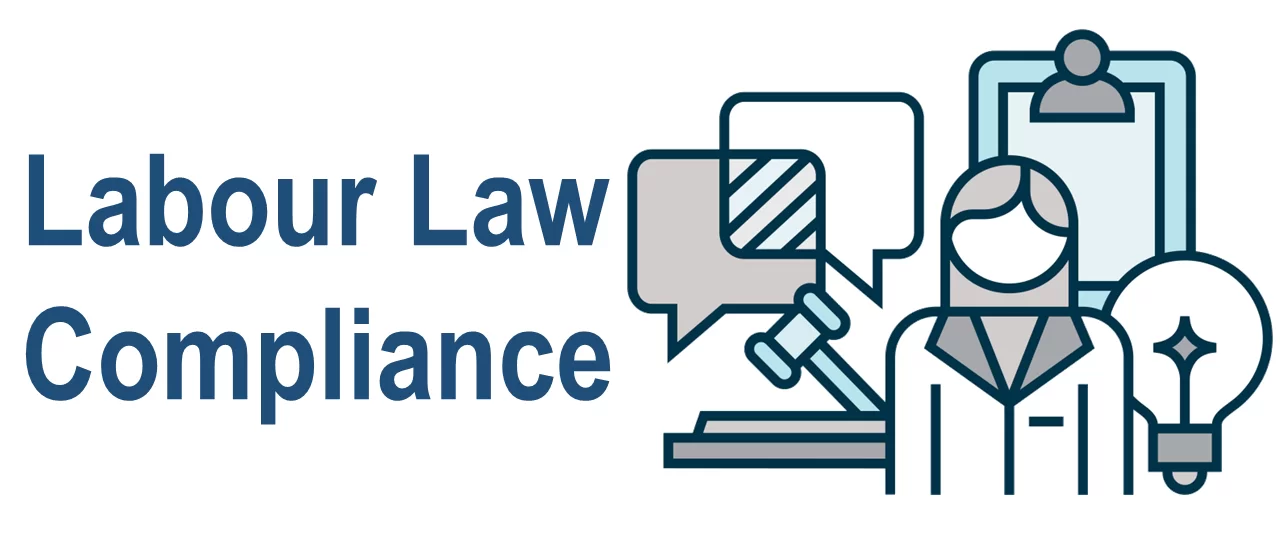Important Checklist for Labor Compliance
Labor compliance in India involves adhering to various laws and regulations to ensure fair treatment, safety, and welfare of employees. Here’s a comprehensive checklist for labor compliance in India:
1. Registration and Licensing
- Factories Act, 1948: Register the factory and obtain necessary licenses.
- Shops and Establishments Act: Register under the respective state’s act.
2. Employment Contracts
- Ensure that employment contracts are provided to all employees.
- Contracts should include terms of employment, job role, salary, working hours, and termination clauses.
3. Wages and Payment
- Minimum Wages Act, 1948: Pay at least the minimum wages as notified by the government.
- Payment of Wages Act, 1936: Ensure timely payment of wages (before the 7th or 10th of each month).
- Equal Remuneration Act, 1976: Ensure equal pay for equal work irrespective of gender.
4. Working Hours and Leave
- Factories Act, 1948: Adhere to working hours (48 hours per week) and overtime regulations.
- Shops and Establishments Act: Comply with state-specific working hours, leave, and holiday provisions.
- Maternity Benefit Act, 1961: Provide maternity leave and benefits.
5. Health, Safety, and Welfare
- Factories Act, 1948: Maintain health, safety, and welfare standards in the workplace.
- Employees’ State Insurance Act, 1948: Provide ESI benefits to eligible employees.
6. Social Security
- Employees’ Provident Fund and Miscellaneous Provisions Act, 1952: Contribute to EPF and maintain records.
- Employees’ Pension Scheme, 1995: Contribute to and manage pension schemes.
- Payment of Gratuity Act, 1972: Provide gratuity to employees who have completed five or more years of service.
7. Dispute Resolution
- Industrial Disputes Act, 1947: Set up mechanisms for handling industrial disputes and grievances.
- Standing Orders Act, 1946: Draft and implement standing orders for workmen.
8. Record Keeping and Returns
- Maintain records of employees, attendance, wages, overtime, and other relevant details.
- Submit periodic returns as required by various labor laws.
9. Child and Adolescent Labor
- Child and Adolescent Labour (Prohibition and Regulation) Act, 1986: Prohibit the employment of children below 14 years and regulate employment of adolescents (14-18 years).
10. Sexual Harassment and Anti-Discrimination
- Sexual Harassment of Women at Workplace (Prevention, Prohibition and Redressal) Act, 2013: Establish an Internal Complaints Committee and follow prescribed procedures.
- Ensure a non-discriminatory workplace as per various anti-discrimination laws.
11. Contract Labor
- Contract Labour (Regulation and Abolition) Act, 1970: Regulate employment of contract labor and ensure their rights and welfare.
12. Apprenticeship and Skill Development
- Apprentices Act, 1961: Register apprentices and adhere to training guidelines.
13. Compliance Audits and Inspections
- Conduct regular internal audits to ensure compliance with all applicable labor laws.
- Cooperate with labor inspectors and provide necessary documents during inspections.
14. Updates and Amendments
- Stay updated with amendments and changes in labor laws.
- Implement changes in policies and procedures as required.
Conclusion
Regularly reviewing and updating compliance practices, training HR personnel, and using compliance management software can help in maintaining labor law compliance in India.
No comments found.
Leave A Reply
Your email address will not be published. Required fields are marked
